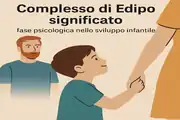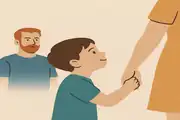What is the meaning of the Oedipus complex? It is a crucial stage in a child's development. We can define it as a very specific moment, both from an evolutionary and organizational perspective, affecting the individual's life and level of mental well-being. It is also a transitional period during which substantial differences emerge that are part of a child's life and effectively determine their level of psychological growth.
In a specific time frame, affecting children between the ages of three and five, a shift in the child's perception occurs. What exactly happens during this stage? What are the specifics of psychophysical development in the child that allow them to distinguish between male and female figures?
The complex manifests itself in children between the ages of three and five with the projection of an emotional-loving impulse toward the parent of the opposite sex. Conversely, toward the same-sex parent, there is a feeling that has a negative connotation.
In practice, the child feels that he or she is dealing with a rival in terms of the emotional attention the child desires from the same-sex parent.
This translates into a hostile attitude toward the parent, experienced as a real obstacle to the realization of one's desire. This is what happens under normal conditions, in the reverse version, when the child projects his own impulses toward the parent of the same sex and instead has a hostile attitude toward a parent of the opposite sex. We are talking about a complex that has a negative connotation.
It must also be said that this complex often presents itself in a complete form and involves both parents. Therefore, on the child's part, there is an emotional conflict involving both parental figures, to the point that feelings oscillate between manifest affection and a sense of hostility towards both.
Greek Mythology
What does Oedipus represent in psychoanalysis? It is effectively a Greek mythology in which Oedipus, a child with no knowledge of his origins, kills his father Laius to marry his mother. The fairy tale fully represents a discovery typical of childhood during which the child experiences impulses and desires of possession that concern the parent towards whom he feels a deep feeling of affection.
Behind this complex, we find a world that is childhood, where a whole series of interconnected, crucial elements for development exist. Therefore, fantasies, anxieties, and internal conflicts are part of this specific phase.
Oedipus is, in effect, a child placed in a complex world of emotional relationships where prohibitions and possibilities exist based on each individual's roles. A child like Oedipus must confront a situation that creates a conflict within him between an incest he shouldn't commit because it's forbidden and the very strong desires and impulses that reside within him.
The father is seen as a rival, and therefore he fears he might retaliate. At the same time, the father figure is also the object of his love, so the desire to dominate him also fuels feelings of anguish related to his loss.
If we were to speak of a male child in general terms, the child develops a sort of anxious feeling regarding possible castration. Punishment for incestuous desires.
Phase of Overcoming the Complex
In normal child development, at a certain point this complex is overcome. This happens when the child understands and realizes that his parents existed before him, and therefore their relationship predates his birth.
How this complex is overcome depends on a combination of factors. First, the stages of his previous development have occurred, then there is a relational factor that concerns the way in which the parents have built the relationship between themselves and with their child.
How does a child overcome this specific complex? At a certain point, a change occurs in the way he sees and perceives his parents. The child understands that his parents are distinct and separate people, and therefore the way he perceives them changes.
His fantasy of possession fades and is replaced by a different feeling. Now the child's desire is based on an imitative model. He wants to be like his parents, he wants to imitate them, and for him they are a model to aspire to.
The child realizes that he cannot do everything he sees his parent do, this is because some things are linked to the adult world and consequently he will have to wait for the fundamental stages of his development to reach a certain threshold.
What Happens After Age Five
Now that we've discussed the Oedipus Complex and its meaning, we must ask ourselves what exactly happens to a child after age five? Those phases of sexuality characterized by desire and drives toward their parents fall by the wayside. A phase of sexual latency begins, during which children are effectively engaged in other phases of their lives.
School commitments begin, along with a certain desire to discover a world outside their family of origin. When they return to adolescence, they will rediscover certain latent drives that will resurface, but their object will be someone outside the family nucleus.
This will also be a very important phase, determining the choice of a partner outside their family nucleus on whom to direct their emotional and amorous attention, as well as their own drives.
Overcoming the Complex: A Key Stage
When we talk about the Oedipus Complex, we're referring to a key stage in a child's development and growth process. It's a stage in which the development of a series of conscious and unconscious fantasies reaches its limits in prohibitions.
This then leads, in a later stage of development, the child to project his or her fantasies, drives, and even desires outward, toward the outside world.
We're therefore talking about a very important moment in defining the differences between the sexes, and it decisively influences the structure of the child's future relationships and his or her specific sexual identity.

